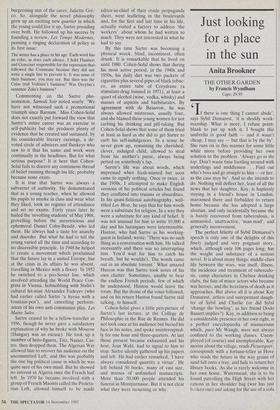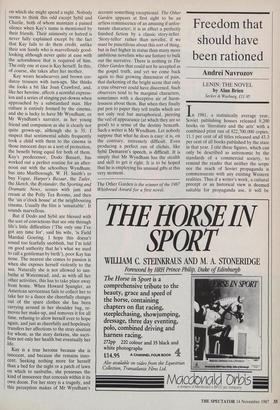Just looking for a place in the sun
Anita Brookner
THE OTHER GARDEN by Francis Wyndham
Cape, f9.95
41 f there is one thing I cannot abide', says Sybil Demarest, 'it is shoddy work- manship. What is more, I refuse point- blank to put up with it. I bought this umbrella in good faith — and it wasn't cheap, I may say — but that is by the by'. She runs on in this manner for some little while more before providing her own solution to the problem. 'Always go to the top. Don't waste time footling around with underlings and middlemen . . . Find out who's boss and go straight to him — or her, as the case may be'. And so she intends to do. Nothing will deflect her, least of all the news that her daughter, Kay, is haplessly staying in a friend's house in London, marooned there and forbidden to return home because she has adopted a large alsatian, and only incidentally because she is barely recovered from tuberculosis, is unmarried, unattractive, `man-mad', and generally inconvenient.
The perfect felicity of Sybil Demarest's speech is only one of the delights of this finely judged and very poignant story, which, although only 106 pages long, has the weight and substance of a serious novel. It is about many things: middle-class life between the wars, war itself, illness, the incidence and treatment of tuberculo- sis, camp characters in Chelsea drinking clubs, the fate of minor actors who become war heroes, and the heaviness of death as it approaches. But above all it is about Kay Demarest, artless and unrepentant daugh- ter of Sybil and Charlie (or did Sybil `change the bowling', as her friend Dodo Bassett implies?). Kay, in addition to being a considerable presence in her own right, is a perfect encyclopaedia of mannerisms which, pace Mr Waugh, were not always confined to the working classes. Unem- ployed (of course) and unemployable, Kay moons about the village, reads Picturegoer, corresponds with a fortune-teller in Hove who reads the future in the way grains of sand fall onto a tray, and fails to return her library books. As she is rarely welcome in her own home, Watermead, she is to be found patrolling the High Street with her rations in her shoulder bag (war has just broken out) and asking for the use of a sofa on which she might spend a night. Nobody seems to think this odd except Sybil and Charlie, both of whom maintain a pained silence when Kay's name is mentioned by their friends. Their animosity or hatred is never fully explained except by the fact that Kay fails to do them credit, unlike their son Sandy who is marvellously good- looking although never quite at ease with the actorishness that is required of him. The only one at ease is Kay herself. In this, of course, she takes after her mother.
Kay wears headscarves and brown cor- duroy trousers with turn-ups. She thinks she looks a bit like Joan Crawford, and, like her heroine, affects a scornful express- ion and a series of stinging put-downs when approached by a substandard man. Her culture is entirely formed by the cinema, and she is lucky to have Mr Wyndham, or Mr Wyndham's narrator, as her young friend and companion as she is clearly not quite grown-up, although she is 35. I suspect that sentimental adults frequently took a child with them to the cinema in those innocent days as a sort of protection, the benefit being equal for both of them. Kay's predecessor, Dodo Bassett, has worked out a perfect routine for an after- noon out with the schoolboy Wyndham: bus into Marlborough, W. H. Smith's to buy Vogue, Harper's Bazaar, the Taller, the Sketch, the Bystander, the Sporting and Dramatic News, scones with jam and cream at the Polly Tea Rooms, and then the 'six o'clock house' at the neighbouring cinema. Usually the film is 'unsuitable'. It sounds marvellous.
But if Dodo and Sybil are blessed with the sort of convictions that see one through life's little difficulties (The only one I've got any time for', said his wife, 'is Field Marshal Goering. I hope this doesn't sound too fearfully snobbish, but I'm told on good authority that he's what we used to call a gentleman by birth'), poor Kay has none. The nearest she comes to passion is when she exposes herself violently to the sun. Naturally she is not allowed to sun- bathe at Watermead, and, as with all her other activities, this has to take place away from home. When Howard Spangler, an American serviceman fails to collect her to take her to a dance she cheerfully changes out of the spare clothes she has been carrying around in her shoulder bag, re- moves her make-up, and removes it for all time, refusing to allow herself ever to hope again, and just as cheerfully and hopelessly transfers her affections to the stray alsatian for whom, as the story darkens, she sacri- fices not only her health but eventually her life.
Kay is a true heroine because she is innocent, and because she remains inno- cent. Seeking nothing more for herself than a bed for the night or a patch of lawn on which to sunbathe, she possesses the kind of innocence that conceals within it its own doom. For her story is a tragedy, and this perception makes of Mr Wyndham's account something exceptional. The Other Garden appears at first sight to be an artless reminiscence of an amusing if unfor- tunate character; it is in effect a perfectly finished fiction by a classic story-teller. `Story-teller rather than novelist, if we must be punctilious about this sort of thing, but in fact higher in status than many more ambitious novelists who use fantasy to bulk out the narrative. There is nothing in The Other Garden that could not be accepted as the gospel truth, and yet we come back again to that growing dimension of pain, that darkening of the bright scene that only a true observer could have discerned. Such observers tend to be marginal characters, sometimes with a deceptive air of harm- lessness about them. But when they finally put pen to paper they tell truths which are not only real but metaphorical, piercing the veil of appearance (at which they are so good) to a sense of the destiny beneath. Such a writer is Mr Wyndham. Let nobody suppose that what he does is easy: it is, on the contrary, extremely difficult. Even producing a perfect run of clichés, like Sybil Demarest's speech, is difficult. It is simply that Mr Wyndham has the stealth and skill to get it right. It is to be hoped that he is employing his unusual gifts at this very moment.











































































 Previous page
Previous page